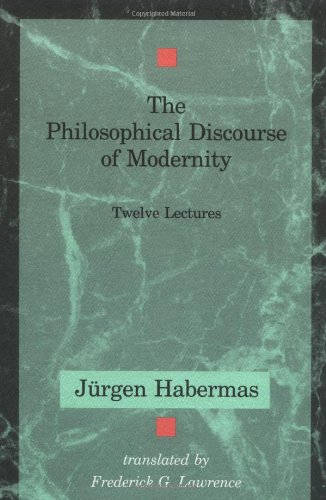The Philosophical Discourse of Modernity download
Par yang anne le lundi, juin 27 2016, 22:06 - Lien permanent
The Philosophical Discourse of Modernity. Frederick Lawrence, Jurgen Habermas, Thomas McCarthy

The.Philosophical.Discourse.of.Modernity.pdf
ISBN: 0745608303,9780745608303 | 456 pages | 12 Mb

The Philosophical Discourse of Modernity Frederick Lawrence, Jurgen Habermas, Thomas McCarthy
Publisher: Polity Press
Excursus on Cornelius Castoriadis: The Imaginary Institution. <>The obvious starting point for the analysis of the Habermas – Derrida debate is Habermas' 1987 book The Philosophical Discourse of Modernity in which one 'lecture' and one 'excurses' deal with Derrida. Jürgen Habermas, The Philosophical Discourse of Modernity. Scientific reasoning does not sit easily with the presuppositions of any religion, and the work of Enlightenment philosophers made the belief in God appear irrational…It is easy to imagine Mohammed Atta, at Hamburg . From "The Philosophical Discourse of Modernity". In The Philosophical Discourse of Modernity: Twelve Lectures, 106-130. Frankfurt a.M.: Suhrkamp, 127-183. Philosophical discourse of modernity when it is suggested in the last chapter that if Foucault's theory(!) is pushed foward, it dialectically result in Habermas. Reflections, a pretty comprehensive blog on Jurgen Habermas's work when i came upon an article by Thomas Biebricher, which examines Habermas' interpretation of Foucault in the Philosophical Discourse of Modernity. Since the 1960s the Frankfurt School has been guided by Jürgen Habermas' (born 1929) work on communicative reason, linguistic intersubjectivity and what Habermas calls “the philosophical discourse of modernity“. There is some useful discussion on Gary's site about Habermas' twelve lectures on the philosophical discourse of Modernity. Cambridge, Mass.: MIT Press, 327- 335. Moments of fascinated shock, when those categories fall apart that guarantee in everyday life the confident interaction of the subject with himself and with the world (Habermas, The Philosophical Discourse of Modernity, pp. In their attempts to overcome the philosophy of the subject, Hegel and Marx had been ensnared in its own basic concepts. For short accounts relevant for the present purpose, see Habermas, Jurgen, The Philosophical Discourse of Modernity, translated by Frederick G. In: idem, The Philosophical Discourse of Modernity. Philosophical Discourse of Modernity. Cambridge, Mass.: MIT Press, 1987. This perspective is precisely part of a discourse of modernity that is established in the 19th century in the wake of the Industrial Revolution and becomes dominant in the USA after the Scopes trial in the 1920s.